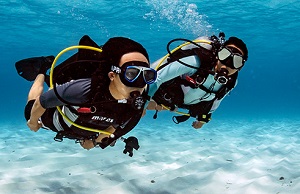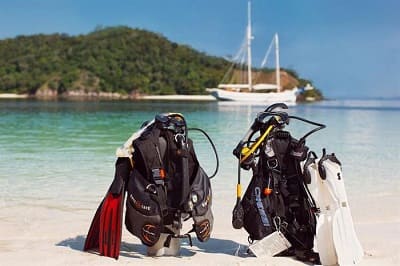Private Scuba › Courses › Discover Scuba
Discover Scuba Diving
The PADI Discover Scuba Diving program gives beginners a quick and easy tryout to become a diver for a day and see how much you like it.
Swimming proficiency is not required for this limited try-dive. So, you can learn to dive in a pool, from a beach, or from a dive boat via the DSD program.
What is PADI Discover Scuba Diving (DSD)
Are you wondering what it takes to explore the underwater world? You can try out the basic steps in the PADI DSD diving program.
You will learn:
- The most important guidelines and safe diving skills.
- How to wear and use scuba equipment (e.g. mask and fins).
- What it feels like to breathe underwater (using a regulator).
- How to swim underwater while wearing the gear.
- The benefits of completing the PADI Open Water Diver course.
Note: You will get direct supervision from a PADI Professional for the whole experience. They will also guide your practice sessions in shallow water before you make an open water dive.
Discover Scuba Diving Requirements
Are you curious to know what it feels like to breathe scuba underwater? You can try scuba diving without having to take a certification course. The PADI Discover Scuba Diving package makes it possible for learners.
The primary objective is to get you comfortable and feeling confident in a shallow depth. Then, your instructor will lead you into deeper water for the first time. This is where you can swim around coral reef formations and explore diverse sea life creatures.
There are no specific prerequisites to try the PADI Discover Scuba Diving experience. Thus, absolute beginners can go scuba diving and join in the fun.
In case you were wondering:
Twelve metres (forty feet) is the maximum depth allowed for the DSD program. What's more, PADI dive shops can credit the one day try dive towards the full international certification.
From the age of ten (10), anyone in good health, reasonably fit, and comfortable in water can take part in the DSD lessons. It is an ideal way to participate in a one day scuba experience program.
Your level of comfort underwater, and the discretion of your instructor, will determine how deep you go down. But, the maximum depth you can go during this scuba tryout for novices is 12 metres.
Note: Another section highlights a few other limitations to the PADI introductory dive course (e.g. scuba diving age restrictions).
DSD Resort Course Outline
The resort course begins by completing the mandatory registration form and participant statement. The participant brochure is a manual booklet required for the experience. It is not a licence to dive independent of instruction.
 PADI paperwork provides valuable information about 'medical suitability' to participate in the discovery program.
PADI paperwork provides valuable information about 'medical suitability' to participate in the discovery program.
You will receive a brief knowledge and safety review flip chart (or cue card session) and then learn how to scuba.
After the discover scuba diving briefing, you get to practice all the basic lessons for beginners in a shallow body of water.
Then, when you are relaxed and breathing comfortably, it will be time to go scuba diving - directly supervised by a qualified instructor.
What is most surprising for many first time divers in the PADI Discover Scuba program? Well, you realise how easy it is to breathe through a regulator while submerged underwater.
So, you get the opportunity to decide whether you enjoy diving without plunging into a full course. If not, you may enjoy a snorkeling trip instead.
But wait - there’s more:
The dive shop provides you with all the appropriate diver equipment that you need for the course. You learn how to use basic dive gear, which will include:
- Mask and snorkel
- Buoyancy controller
- Air tank and regulator
- Instrumentation gauges
- Wetsuit
- Weight system
Note: There is no need to panic about using the equipment! Your dive leader will oversee the gear operation while you are submerged underwater.
Discover Scuba Diving Program [1 Day]
It usually takes one (1) full day of diving to complete the DSD program (e.g. 2 dives in open water) from the dive boat. But, we also conduct the half day scuba discovery experience in a swimming pool - if you don't have enough time.
You will get:
- Free rental of modern scuba equipment.
- Expert instruction about how to use basic scuba gear underwater.
- Personalised supervision and Private Scuba lessons from your instructor.
- Two (2) shallow water dives around the coral islands.
- Hotel transfers (within the city limits).
- Buffet food and soft drinks onboard the dive boat.
- The PADI Discover Scuba Diving Certificate Award.
We can often credit basic dive skills that you will learn in the discovery program towards other international scuba certifications (e.g. PADI Scuba Diver). Being able to credit skill sections can reduce course costs.
Price for PADI Discover Scuba Diving in Pattaya, Thailand 3,700 THB
FAQ about Scuba Programs for Beginners
Does Discover Scuba Count towards Open Water?
The short answer is yes - as long as you had an actual scuba experience in an open water environment. If so, your instructor can credit the dive towards either the PADI Scuba Diver certification or the Open Water Diver course.
Note: Check out Scuba Steve's article full of first time scuba diving tips for beginners, and why you don't need to be an Olympian or a Navy Seal to start enjoying underwater experiences.
How Deep Can You Go On the Discovery Dive?
Beginners must follow the Discover Scuba Diving depth limit of twelve metres (forty feet) along with a few other safety rules. But, the maximum depth limits for learners will increase to eighteen metres (sixty feet) when taking the Open Water certification course.
Another section contains more information about scuba diving age restrictions and how program limitations apply to the DSD experience.
 How Much is the Discover Scuba Course?
How Much is the Discover Scuba Course?
The following prices include professional supervision, rental equipment, with food and drinks served on the boat:
- Budget Package 2,900 THB (one dive)
- Basic Package 3,700 THB (two dives)
- Deluxe Package 4,000 THB (two dives, with underwater photographs, free scuba t-shirt)
- Gold Package 4,900 THB (two dives, with underwater photographs and video, and our free scuba t-shirt)
Important: Another section contains the snorkeling and scuba courses price list with extra details about the number of dives included in each certification.
How Long Can You Scuba Dive at 12 Metres (40 feet)?
In most cases, diving shallower than twelve metres means your air supply will determine your stay under water - rather than the no-decompression limits (NDL limits).
Even so, you would need to be submerged for well over three hours on your first dive for it to be a concern.
Can I Touch the Underwater Organisms?
Divers share a common responsibility to protect and conserve nature. As a result, interacting passively with aquatic animals helps to safeguard the habitats of delicate and sensitive sea life.
What Should I Not Do after Scuba Diving?
After cleaning the gear, there are several kinds of activities that divers should avoid doing after using scuba equipment, including:
- Exercising
- Flying in a plane (including traveling to altitude, such as mountain hiking)
- Having a full body massage, hot bath, or hot shower
- Drinking alcohol
- Forgetting to log the dives
What are the Medical Requirements for Scuba Diving?
A certain level of well-being and general fitness is needed to carry out scuba activities. Thus, you may need to get written approval from a physician before you go diving.
You can download the online version of the Diver Medical Participant Questionnaire to check if your current medical status will require a physician's approval.
Note: You should not ask dive staff (e.g. divemasters, instructors) for medical advice and clearance to go diving. Instead, you can contact the Divers Alert Network (DAN) if you have questions about your medical fitness to dive.
Related Information and Help Guides
- Get a Certification in CPR and First Aid
- List of PADI Scuba Courses in Thailand
- PADI Scuba Diver Course Requirements
Note: The short PADI video [3:09 seconds] outlines what to expect when you try scuba diving for the first time. Click here to contact Private Scuba in Pattaya, Thailand.